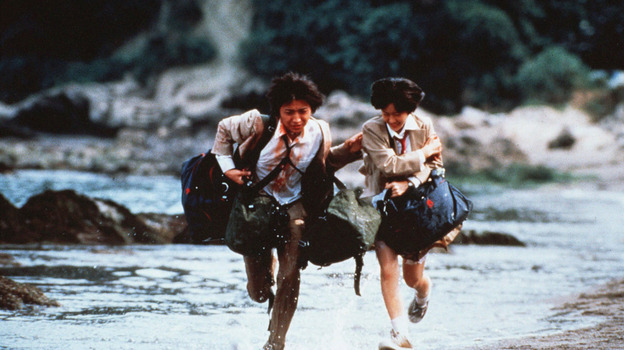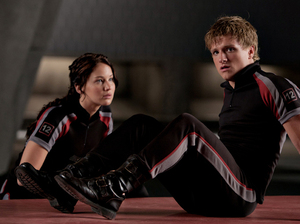
Toei / The Kobal Collection Shuya Nanahara (Tatsuya Fujiwara) and Noriko Nakagawa (Aki Maeda) are two Japanese high school students among 42 left on a deserted island, each with a bag of supplies and weapons, and forced to fight to the death in Battle Royale.
We're talking Battle Royale, of course. It's a Japanese novel that was adapted into a blockbuster movie in 2000 — eight years before the American book The Hunger Games.
Among the admittedly select group of people who like both Japanese movies and young-adult fiction, it's been a burning question: Did author Suzanne Collins knock off Battle Royale to write The Hunger Games?
Grady Hendrix, for one, says he can't help but wonder, and he's in a unique position to do so: Hendrix writes YA fiction, and he's one of the directors of the New York Asian Film Festival.
Hendrix has read the interviews where Collins has flatly denied knowing about Battle Royale before she wrote The Hunger Games. But Hendrix says the plots are eerily similar: school kids chosen by lottery, given a variety of weapons and survival packs and taken to a remote, restricted area to take part in a televised death match.
"I like The Hunger Games fine," Hendrix says pointedly, "but I couldn't help but make the comparison."

LionsgateIn The Hunger Games, Katniss (Jennifer Lawrence) and Peeta (Josh Hutcherson) train to compete against other teenagers in a fight to the death that all citizens of a ruined North American dystopia must watch.
"I'm not a big horror person myself," she says. "But I did finally go see it, and was really pleasantly —" she catches herself, laughing at the idea of "pleasant" in this context — "surprised."
"Because it wasn't the nihilistic bloodbath I had expected," she says.
McKnight is a fan of Battle Royale director Kinji Fukasaku, best known for a series of incredibly well-respected gangster movies — kind of a Japanese version of The Wire. With Battle Royale, she was surprised by its evenhanded gender politics.
"Girls were imagined to be just as vicious as boys," she observes. "And not just in the backroom-gossip and catfight mode, but out-and-out violent."
The violence in Battle Royale is certainly bloody and intense, but it's never gratuitous, says Grady Hendrix. As with The Hunger Games, he says, the story is intended as a jolting parable about war.
Hunger Games author Suzanne Collins came from a military family. But Battle Royale director Kinji Fukasaku actually survived World War II. He was just a teenager himself when he was put to work in a munitions factory in Japan.
"It was bombed, a lot," Hendrix says. "And one of his jobs, at the age of 15, was to take a wheelbarrow around the factory and pick up body parts after bombing raids."
The experience left Fukasaku with a lasting abhorrence of war — and a profound sense of betrayal by grownups that persisted into his own adulthood. And it fueled his decision to film Battle Royale, which was both highly controversial and a massive theatrical hit when it was released in Japan, despite a rating that kept young teenagers from seeing it. That irritated the director, says Hendrix.
"He gave a very famous statement to the press where he said, 'Kids, if you have the courage, you can sneak in. And I encourage you to do so.'"
The Hunger Games novel was gory and disturbing for a reason, says Hendrix. Just like Battle Royale, it's supposed to communicate war's horrors to young teenagers. Hendrix worries that the Hunger Games movie will tone down the violence, and thereby make it exciting.
"The line between making violence graphic and upsetting and making violence graphic and cool is a very narrow one," he says.
Hendrix says one of the most important things Battle Royale and The Hunger Games share is the idea of teenagers trapped in a ruined society, coerced by grownups into doing horrible things.
Even so, they both make it clear — there's nothing more utopian than a teenager. Even in a dystopia.
No comments:
Post a Comment